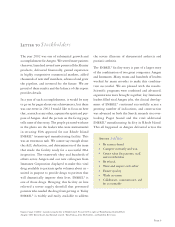Amgen 2002 Annual Report Download - page 19
Download and view the complete annual report
Please find page 19 of the 2002 Amgen annual report below. You can navigate through the pages in the report by either clicking on the pages listed below, or by using the keyword search tool below to find specific information within the annual report.
Page 17
In 2001, Amgen introduced a new, longer-lasting anemia therapeutic for chronic kidney
disease patients, once again advancing the treatment options for this debilitating condition.
Aranesp
®
(darbepoetin alfa) is approved in the United States, Europe, Canada, Australia, and
New Zealand for the treatment of anemia associated with chronic renal failure in patients both
on dialysis and not on dialysis.
Aranesp
®
is an effective erythropoietic protein with greater biological activity and a longer
half-life than Epoetin alfa. Because it requires less-frequent dosing than Epoetin alfa, this inno-
vative therapeutic may optimize anemia management, allowing health care providers to spend
more quality time caring for their chronic kidney disease patients. Currently, only a small
proportion of patients are treated for anemia prior to the onset of dialysis, despite growing
evidence to suggest that early treatment may improve clinical outcomes.
Amgen’s success in creating a more powerful erythropoiesis-stimulating protein grew out
of the company’s groundbreaking research programs in hematology and stem cell biology.
Amgen researchers discovered that increasing sialic acid content increases serum half-
life and biological activity of recombinant erythropoietin. Aranesp
®
was created by
introducing amino acid changes to human erythropoietin permitting the cells to attach
two additional sialic acid-containing carbohydrate chains to this erythropoietic molecule.
These additional sialic acids keep this molecule in the blood stream longer than maximally
sialylated recombinant erythropoietin, providing greater biological activity. The longer
half-life allows patients to have their anemia managed with significantly fewer doses of
Aranesp
®
compared with Epoetin alfa therapy.
Amgen continues to study the effectiveness of Aranesp
®
in correcting anemia in patients
with chronic kidney disease, including the impact of such therapy on these patients’ quality
of life and long-term treatment outcomes. As the evidence mounts that patients with chronic
kidney disease can derive meaningful value from anemia therapy, doctors may begin testing
for anemia and using Aranesp
®
earlier in the progression of renal failure. Dialysis for patients
with impaired kidney function usually begins only when they have reached end-stage renal
failure – the loss of more than 85% of kidney function.
According to the National Kidney Foundation, diabetes and high blood pressure are the two
leading causes of chronic kidney disease, generating three out of four new cases each year in
the United States. Amgen remains committed to working with the medical community to
expand the understanding of chronic kidney disease and broaden treatment interventions.
























